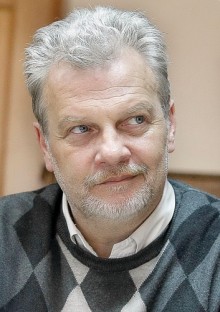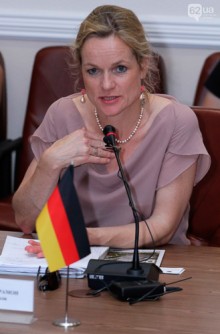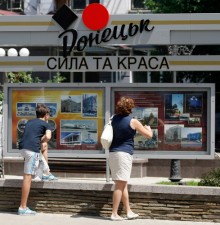“Kyiv Dialog” is an independent non-political initiative that emerged from the dialog of Ukrainian and German civil societies about the idea of creation of a free, democratic Europe. The project was created to provide information on the European integration process and spread the knowledge about Europe. A public podium discussion “Structural reforms in Donbas. Chances and opportunities for the region after eventual signing of the Association Agreement with the EU” took place in Donetsk on June 17 within the framework of “Kyiv Dialog.” The discussion was joined by representatives of Germany (member of the “Alliance 90/The Greens” in the Bundestag, spokesperson for the European Union’s external relations Viola von CRAMON and Consul General of the Federal Republic of Germany in Donetsk Klaus ZILLIKENS) as well as Ukrainian representatives (professor of the economic theory department at the National University “Kyiv Mohyla Academy,” chairperson at the Institute of Economic Research and Policy Consulting Ihor BURAKOVSKY and professor of the international relations and foreign policy department at the Donetsk National University Ihor TODOROV).
Von Cramon thinks that the transformation of Donbas can be successful and similar to the changes in Eastern Germany after joining the Western part of the country. “The situation in Ukraine can change only if the changes are structural and comprehensive. Donbas will never be able to attract tourists and investors if infrastructural, cultural, and social prerequisites are not provided. Ukraine has a real chance to compete in Europe, but fears arise because people do not know this,” she says. Meanwhile, Todorov thinks that “Donbas is the locomotive of the European integration of Ukraine, but its residents lack Ukrainian identity.”
Here are the commentaries from “Kyiv Dialog” participants on the opportunities for Donbas and risks for Ukraine:
Viola von CRAMON: “We must take environmental care and human rights in Donbas as a basis”
“One of the first and the most important questions: why does the European Union want to have Ukraine as its partner? For Germany this does not mean that Ukraine has to choose an anti-Russian position. For Ukraine this is an opportunity to solve issues on the international level together. Among the problems that we could settle together are environmental protection and public safety, including war on organized crime.
“It is the fourth time I have visited this region, and I have developed a few ideas on settling the problems here. Let us look at the city of Mariupol, for example. The city’s population cannot feel the changes instantly, it is a long process. The Association Agreement will demand for enterprises to comply with the European standards. This relates to working conditions, environmental pollution of water, soil, and air. For example, if an enterprise exports its goods to the EU, then the standards of production of these goods will be raised. Support and help from the European Union will be provided for such enterprises. For example, we must set a goal for water in Mariupol to be as clean as it is in the Ruhr area in Germany. Of course, this involves a long process of transformation for the region. But we have this experience already: when Western and Eastern Germany united, there were both public and private investments involved. This process could only be finished thanks to adherence to the requirements. There is another matter in Mariupol: creation of jobs that will be offered to the region dwellers in place of the ones they lost. Investments from everywhere are required. For this, legal security is required, which will be provided to the member of the Association Agreement. Also, favorable investment climate is needed, for example, in the banking sector. The Association Agreement could help create this platform.
“It should be understood that the restructuring process will take place anyway, and production will decrease. We need strong labor unions. Not everyone will be able to work in industry, and with time there will be no need for it. But a worker must be sure that if they lose a job in the industrial sector, they will be provided with another decent job, perhaps, even if in an absolutely different field. For example, it can be a position in the energy efficiency field, like installation of solar panels. That is why there has to be a person responsible for the work force redistribution and retraining. A similar system works efficiently in Germany. But it is possible only because the system of links between labor unions and the state is well-established and well-funded.”
Ihor TODOROV: “Europe does not set requirements that would be impossible for us to implement”
“I would like to note that for the first time in the history of the European Union, it has such grand desire, claims, and demands relating to a particular country. I cannot remember any other country arising this much interest from the EU. This is proven by the requirements of the Fuele List, first, there were 19 of them, and now there are 11. We understand that all of them must be fulfilled. Of course, Europe does not set requirements that would be impossible for us to implement.
“So, on one hand, there is a theoretical possibility that all requirements will be met. But on the other, there is an opinion (in both the EU and Ukraine) that all of them cannot be met. What is to be done in this case? The EU has exclusive policy on requirements towards Ukraine, but it does not have a real mechanism of influence. In reality, a set of interests are at work here which are sometimes contradicting each other and are typical for our political elite, both governmental and oppositionist. And they are largely connected with another vector. Unfortunately, it is typical for us when relations with the Russian Federation objectively depend on relations with the European Union. And the situation now is similar to the one in 2008, when Ukraine was one step away from signing the agreement with NATO.
“The problem is that a large part of our economic elite acts in its own interests rather than in the national ones. It is good when national interests coincide with those of their wallets, if not – that is just too bad for national interests. That is why some statements on the advantages of the Customs Union can be heard, but there is no going back the ‘European path.’ It seems that they are trying to use this contradiction. That is, a search for ways to improve their own interests is enacted. It is known that many Ukrainian companies are registered in the EU as legal entities, as the EU residents. Their operation is transparent and conforms to the European standards. That is why they are interested in this vector only. On the other hand, we have shadow structures, which are more satisfied with the Russian option, where similar shadow rules of operation are normal. And Fuele’s requirements are oriented on significant internal changes of this sector of our economy. Of course, Europe cannot influence this. They can only ask the president questions and demand specific answers from him.
“Besides, the opposition might come up with a mixed response to the European integration processes. They might issue an ultimatum: either Tymoshenko and the EU, or no association without Tymoshenko. But this is not right. Especially, since it contradicts Tymoshenko’s own opinion. And by and large, if there are legal obligations for us, Tymoshenko’s release would be a matter of time.
“I would like to be optimistic and say that Ukraine is destined to European integration and full membership in the EU. Undoubtedly, this issue will be played with during the 2015 elections. And from formal point of view, all political forces, except communists, will abuse this issue. Both Party of Regions and the United Opposition will present this information with various accents. Of course, these elections will be a threat to the European integration. We can see it even now. There is a certain political will (and it seems to me that the government already has a fallback plan), and that is why the law on referendum was adopted. And theoretically, the matter of the Customs Union can be brought up to a referendum, and the European association can be neglected. If both of these options are presented, the results will be positive everywhere. Pluralism is a norm for Ukrainian citizens. But if only one option of the Customs Union is presented and the result is positive, all our laws and strategies will come to naught. This card is now played by Viktor Medvedchuk with his so-called ‘Ukrainian choice,’ which in reality is anti-Ukrainian.
“Traditionally, I say that the Association Agreement will provide us with European standards that we will need to implement. For example, things like the quality of roads and consumer rights. Our manufacturers, having the task of entering the European market set in front of them, will have to raise the quality standards for their goods. After all, in such competition between imported and domestic goods, it will be our manufacturer that will win. As for the Donetsk region, there is a set of environmental issues that require a comprehensive approach. This matter will be settled not on the level of domestic policy, but on the level of Ukraine’s international obligations.”










